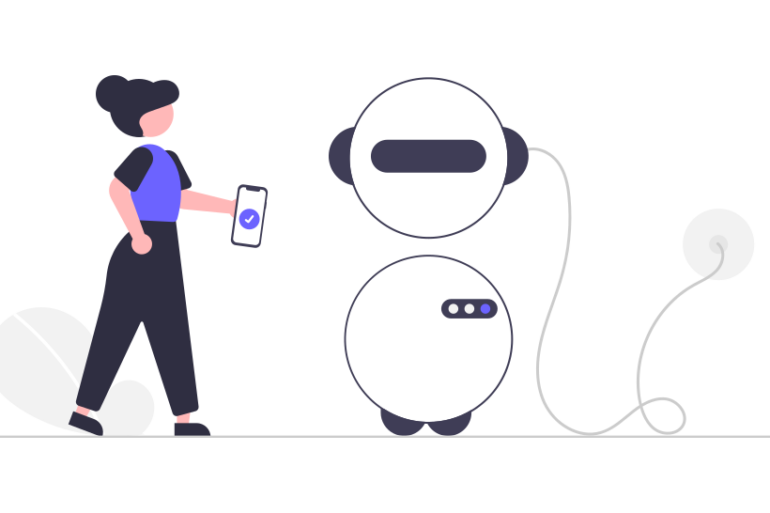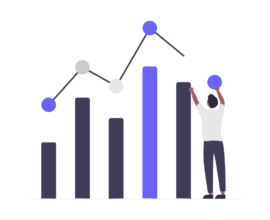Artificial Intelligence is a wide-ranging domain of computer science concerned with the simulation of human intelligence demonstrated by machines. It is a revolution creating technology wherein the software used by computers reciprocates various aspects of human intelligence. The basic purpose of Artificial Intelligence is to enable computers to perform various human intellectual tasks such as decision-making, problem-solving, learning, reasoning, providing perception, analyzing data itself, understanding human communication and many more. Artificial Intelligence today is creating an impact on almost all the industries and all the human beings. Almost all the emerging technologies Big Data, Machine Learning, the Internet of Things, Robotics, or Deep Learning have revolved around Artificial Intelligence. It is serving as a technological innovator for the future.
What exactly is Artificial Intelligence?
Artificial Intelligence is a field of science that is concerned with building smart machines that are capable of replicating humans by performing tasks in a similar fashion that humans tend to perform. It is a technology that models computer systems in such a way that they efficiently perform the tasks thus producing a clear picture of human intelligence process simulation by machines. It is a world-changing technology that can help in diagnosing various diseases, controlling autonomous vehicles, recommending certain searches, augmenting human intelligence and much more. Artificial Intelligence is a term that is applied to the development of systems with the capability of performing human intellectual processes.
Why is Artificial Intelligence important?
Artificial Intelligence proved to be important for businesses because it gave them insights about their processing and operations that otherwise would not have been possible to derive. Artificial Intelligence also can perform more efficiently when it comes to repetitive, detail-seeking tasks like analyzing distinct and large volumes of documents to ensure that all the mandatory fields are filled with appropriate information in a systematic and detailed manner. Artificial Intelligence tools are also capable of performing tasks in a more accurate and precise way, with less time consumption and relatively few errors.
As the best example of Artificial Intelligence, taxi-faring services are now made possible using the technology. In earlier times the passengers had to hire a taxi that they approached, but now with the Artificial Intelligence technology working, the computer software has connected the passengers with the taxis. Now what it does is simply that with the help of the Machine Learning algorithms, it beforehand predicts that in which area more people are likely to book a taxi. So once the prediction is made, the taxi drivers are proactively asked to drive on those roads. This in a way reduces the waiting time for the passengers and also improves the business on the company’s part. Likewise, most companies are now switching to Artificial Intelligence to improve their operations and to get an edge over their competitors.
How does Artificial Intelligence work?
As the craze of Artificial Intelligence is all over the market, businesses are finding ways to promote their products and services using Artificial Intelligence tools and techniques. Very few programming languages are synonymous with Artificial intelligence such as Python, R and Java. The technology requires a specialized set of hardware and software for training the machines and hence is not possible with the use of just any programming language.
Artificial intelligence works by ingesting large loads of data, training the machine models based on the collected data, analyzing the data for any sort of patterns or correlations and then using the modelled data for making predictions for any future data. An example of this is the chatbot that various websites use. It interacts with the people in a similar fashion to what a human would have done instead.
Artificial Intelligence programming emphasizes a set of skills that are important for any machine to work similarly to what human intelligence would have done.
- Learning process:
This is a skill set that Artificial Intelligence has a greater emphasis on. This aspect mostly is focused on collecting data and for creation of certain parameters based on which the data collected is turned into an actionable response. The algorithms are made for the computer device based on which they perform certain tasks in a step-by-step manner. - Reasoning process:
This is a similar aspect which emphasizes choosing the perfect algorithm for performing any particular task to get the desired output. This is also one of the key aspects for the process to give favourable results. - Self-correction process:
Sometimes, any algorithm or any data collected may acquire some sort of error. Getting rid of the anomalies is a common but hectic task which can delay the output generation. The self-correction process is an aspect of Artificial Intelligence that continuously checks for any anomaly and regularly finetunes it, thus ensuring that it results in more accurate and precise outcomes.
Advantages of Artificial Intelligence
As all the technologies revolving around Artificial Intelligence are continuously evolving, the hype of Artificial Intelligence is also accelerating much faster, this is all because of the fact that technology-driven predictions are more accurate and faster as compared to human predictions. So, there arise a greater number of advantages for the technology. The most prominent of them are:
- Reduced time is taken for performing the tasks even if the data fed into the system is way too large.
- Best at predicting outputs as and when compared with humans.
- Good at working with the detail-oriented dataset.
- It prominently delivers the most consistent results.
- Humans at times may need rest But the Artificial Intelligence-powered virtual agents are always at work and available 24/7. This gives the user the benefit of working from anywhere and anytime without anything to worry about.
Disadvantages of Artificial Intelligence
With the pros do come the cons. The Artificial Intelligence powered machines too have got some disadvantages to their name. For processing a large amount of data, Artificial Intelligence does require deep expertise and so increases the costs. The most prominent disadvantages of any Artificial Intelligence are given below:
- Making use of Artificial Intelligence is way too expensive.
- It requires deep technical expertise to get favourable outputs.
- The workers who are skilled enough in developing the Artificial Intelligence tools and algorithms are way too short and hence put a lot of pressure on the qualified workers to develop the systems.
- The machines powered with Artificial Intelligence are only known as to what data is fed into the system and hence are only restricted in performing that limited task.
- It cannot generalize from one task to another and hence increases the time in transferring the information from one system to another.
Applications of Artificial Intelligence
Artificial Intelligence is used in various industries and requires a lot of expertise to work in these industries. Right from Automation, Robotics, Machine Learning, Internet of Things, to Machine Vision, Natural Language Processing, Deep Learning everything makes use of Artificial Intelligence technology. Some of the fields that have incorporated the use of Artificial Intelligence are:
- Healthcare:
The sector that has benefited most from the Artificial Intelligence technologies is the healthcare sector. Many machine models are used for the faster, more efficient and economical diagnosis of the patients. Artificial Intelligence applications in this sector include virtual health assistants and virtual chatbots to help customers find healthcare-related information, understand the billing process, schedule appointments and many other healthcare administrative services. - Business:
Businesses are always looking for ways to improve the customer experience to generate more profit from the products or services provided. Many Artificial Intelligence-based models are incorporated into the sector to find information relating to improving business standards. Many websites have made chatbots available to serve customers 24/7. Also, similarly many more advancements have been made in the business sector. - Education:
Artificial Intelligence in the education sector has automated grading, accessing the student’s needs and rendering them the services as per that, giving the educators more teaching options, helping the students learn at their own pace and much more. The Artificial Intelligence tutors keep regular track of student’s progress and provide assistance to the students so that they always are on track in learning. - Law:
The continuous revising of the documents in the law is a hectic process. The Artificial Intelligence system has automated the process thus enabling the law firm to quickly get to a verdict. Many labour-intensive processes have been handled by the technology thus in a way saving time and also helping in improving client service. - Manufacturing:
At many manufacturing plants, Artificial Intelligence robots are used for production purposes. The robots during earlier times were efficient in performing only a single task but now are capable enough of performing multiple tasks at a time. These robots now even collaborate with humans to perform the task at a faster pace. - Banking and Finance:
The banking and finance sector has also benefited from the arrival of Artificial Intelligence technology. It helps in collecting information, predicting credit scores, ensuring fraud-free service rendering and is nowadays even used for providing financial advice to customers. Artificial Intelligence virtual assistants are also used for improving and reducing the cost of compliance with banking regulations. Credit limit setting and identifying investment opportunities are also done using these technologies. - Transportation:
In the transportation sector, self-driving cars are all a result of Artificial Intelligence. Right from managing traffic in developed countries to predicting flight delays and making travel safer, more efficient, faster and economical is all possible with Artificial Intelligence coming in. - Security:
In the security sector, Artificial Intelligence has created a buzz. The security information and the event management software are used to detect any kind of fraud, suspicious activities, or any sort of threat. By making use of the data and the machine models, Artificial Intelligence can identify any malicious codes. Artificial Intelligence technologies are even capable of providing much faster alerts for any new frauds or attacks that may happen. May it be cyber security or any other type of security, Artificial Intelligence is always paving an edge for the companies.
Artificial Intelligence is closely associated with making human lives simpler, quicker and more efficient. It is the centre of computational model intelligence technologies. As discussed above, this field has really very few qualified workers and is heavily in demand of skilled professionals. If you wish to be one of them and feel that you can ace in the field of Artificial Intelligence then just go for it. But do remember that getting a job in such a field does require a high level of expertise which can only be achieved with proper learning.





